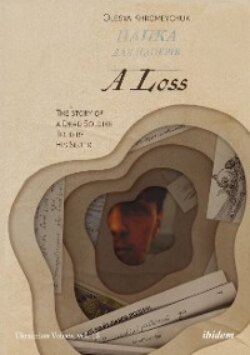Читать книгу A Loss: The Story of a Dead Soldier Told by His Sister - Olesya Khromeychuk - Страница 11
На сайте Литреса книга снята с продажи.
Vertep
ОглавлениеWhen we were little, our parents took us to our grandparents’ village for Christmas. The holiday season teemed with the sort of rituals that cannot help but engrave themselves in a child’s impressionable mind. My most vivid memories are those of the “vertep.” The word itself dates back to the 17th century and refers to a portable puppet theater. Over time, this evolved into a kind of street theater that told the story of Christ’s birth. The peculiarity of this performance lies in the fact that it doesn’t need to involve professional actors: most villages and many cities have numerous troupes wandering the streets, all performing their own versions of the nativity scene. What they might lack in mastery they make up for in enthusiasm.
This traditional Ukrainian nativity play is not really about Jesus. Jesus doesn’t even have a proper part in it. He is only mentioned parenthetically as something that has just happened to us. The main characters are Death, the Devil, the Angel and King Herod. There are also shepherds, Roman soldiers, wise men and other cameo parts. But their role is mostly to highlight, through their own insignificance, the importance of the first four.
Everyone in the Ukrainian villages wants the vertep actors to come to their house. Everyone wants to hear the same story year after year. To see good triumph over evil. Every year, I watched rehearsals and then the performance of the vertep in our old house in the village. Both of my brothers participated in it: Yura invariably played the role of the Angel. My father made his wings out of plywood and stuck bits of white paper on them that I curled up with scissors to resemble feathers. Volodya’s part was that of the Devil. He wore a frightening homemade mask. It was black and covered his entire face. You could just barely see his eyes, but only if you tried hard. That summed the three of us up: one brother in white, caring and kind, the other in black, unnerving and daring. And I: an observer of the performance, stuck in the middle.
The vertep characters have accompanied me throughout my life, and when the Angel, the Devil, Death and King Herod spin around me in a macabre dance of childhood memories it is the Devil’s black mask that hovers for a moment in front of me. It stares right down into my soul, looking for the black inside me. It petrifies me. I don’t want to look. But I can’t turn away. I can’t move. Until I notice, through the holes cut out in the mask, that the eyes don’t belong to the Devil. I know those green eyes.
Volodya played his part in the vertep so well that they kept asking him back every year. Even when he didn’t take part in the nativity anymore, he kept the Devil mask. Sometimes he put it on to frighten others. Sometimes to frighten himself. Mostly, he kept it to remember that life is a blur of white, black and red.
